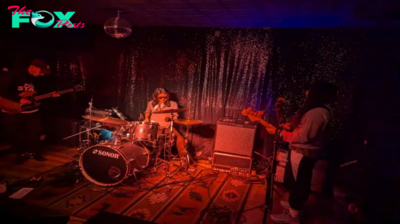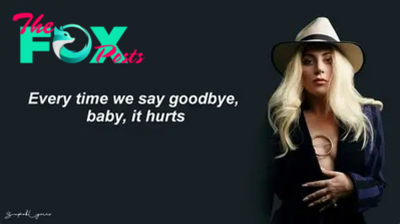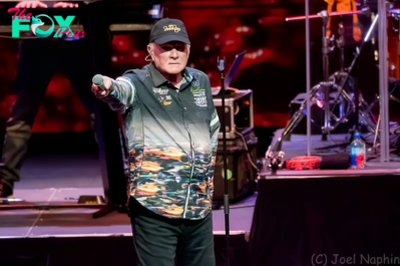Entertainment
AMERICAN THEATRE | Paula Vogel, Tina Landau, and the Room That Made ‘Mom Play’
Paula Vogel and Tina Landau on the opening of “Mom Play.” (Picture by Avery Brunkus)
As soon as begun, the play took simply two weeks to jot down. However in some ways it had been many years within the making. So had the collaboration.
Paula Vogel and Tina Landau have identified each other because the Nineteen Nineties, the identical decade Vogel’s late brother Carl and a model of herself first appeared onstage in her play The Baltimore Waltz. Later that decade, a model of her mom would go to audiences within the Pulitzer-winning How I Realized to Drive. So when it got here to the query of who would direct Mom Play—Vogel’s newest, now at Broadway’s Helen Hayes Theater, by which reminiscences of her brother, mom, and self work together—Vogel turned to Landau, with whom she’d labored on the 2008 Lengthy Wharf premiere of A Civil CoNFLict Christmas and its 2012 manufacturing at New York Theatre Workshop.
As is typical of each artists’ work, the roots of this present manufacturing will be traced even additional again than the ‘90s, to each girls’s childhoods, to Tennessee Williams and Eugene O’Neill and Clifford Odets and the entire historical past of American household performs, even to slightly identified Russian formalist named Viktor Shklovsky and his 1917 essay “Artwork as Gadget.” Keen to listen to how their collaboration labored and the way these influences got here collectively to make the so-referential-it’s-practically-hyper-linked manufacturing (which has acquired 4 Tony nominations), I spoke with Vogel and Landau through Zoom. Our dialog has been edited for size and readability.
HOLLY L. DERR: I’ve so many issues I’d love to speak to each of you about. My first couple of questions are particularly for you, Paula, and they’re about your iNFLuences. I’m questioning first about this affect of yours, Shklovsky, and the place defamiliarization comes from. I’m questioning, to begin with, why is that this the primary time I’m listening to of him? Is that Stalin’s fault? Why does Brecht get all of the credit score?
PAULA VOGEL: I really feel like Bertolt Brecht was simply type of ripping off different writers after which placing his title on prime of theirs. Brecht went to Moscow and got here again and “found” epic theatre; he “found” alienation impact mystically after he went to Moscow, the place he really uncovered Shklovsky and defamiliarization. Alienation impact and defamiliarization are literally the identical, solely Brecht insists that the alienation impact has a political finish, and Shklovsky simply mentioned it’s primary human notion: If we preserve seeing one thing a lot that we don’t have a look at it anymore, there comes a degree the place the factor that we’re stepping over grabs us by the ankle and makes us concentrate. That’s defamiliarization. So I desire giving credit score to the unique one who introduced that phrase into the dialog. It’s one thing I learn in grad college.
I really feel that Tina does this mechanically, and that’s type of a pun in itself, as a result of Shklovsky talks about computerized notion being what we do in life—that we’re mainly sleepwalking via life, and artwork makes us get up. For instance, within the current play of mine she directed, she has a sequence of vignettes about cockroaches. What nobody but has identified is that the cockroaches within the very starting begin out extra horrific and monstrous and develop into extra mythic; the final cockroach sequence has candy little cockroaches popping out of a field. I feel that is what we do to our mother and father: We make them mythological creatures, however with perspective and distance, they’re simply candy little home creatures that come out of our bins.
TINA LANDAU: I heard of Shklovsky via Anne Bogart, and I don’t actually know a lot, however I’ve used the phrase “to Shklovsky one thing.” Like, in case you take an iPhone, you have a look at an object and also you merely like, flip it in a unique path [She turns her iPhone over and shows the image on the back], you’re like, “This isn’t an iPhone, it’s an image of the constellations.” By merely switching your perspective on one thing or altering the item itself, you see it as if for the primary time, not for its use however for its intrinsic qualities.
PAULA: There have been mainly the 2 or three influences in my life—apart from each person who I work with, and each new play that’s written impacts me. It’s Shklovsky, María Irene Fornés, and Bert States, who was my trainer. Bert gave me a way that I may then formulate into my instructing; as soon as I noticed how he was doing it, I did it. So I’ve completely different classes of language acts and completely different classes of how plasticity is used and that type of stuff, nevertheless it was actually Bert who taught me the right way to look formulaically, not generically, at playwriting. He was an amazing author. He died possibly 20 years in the past, however I don’t need his title to exit of style. In case you decide up Bert right now and also you learn him, you’re like, “Oh my God, I perceive the universe otherwise. Wow.” He wrote one thing referred to as Nice Reckonings in Little Rooms, Irony and Drama, and The Form of Paradox, which is his work on Beckett. They’re simply these elegant little essays.
You will have talked about completely different classes of language acts and the idea of plasticity. Is there a phrase that you just use on your performs’ buildings? My tendency is to wish to name them episodic, however now that I do know that you’ve got different influences, is there a greater strategy to discuss your use of construction?
PAULA: You understand, it’s attention-grabbing as a result of I really feel that all the things that Tina constructs within the manufacturing is definitely fantastically ready in an episodic method. I’d additionally say that we talked quite a bit about sample. Viewpoints is extremely helpful; it’s such an unimaginable strategy to give us company for the storytelling. I don’t know in case you agree with that, however that’s how I really feel—Viewpoints opens up the room for collaboration. I don’t know in case you agree with this, Tina, however I type of consider it as a sample play.
TINA: Completely. Yeah, there are episodes, however in some unspecified time in the future I bear in mind the actors saying to me, “Why do I preserve going again or preserve doing that?” This household type of goes in these cycles which might be variations of a theme again and again and over, and the sample is constructed into their pathology, actually.

By way of Viewpoints and composition, how a lot did these instruments serve you, Tina, on this explicit play?
TINA: All the time and really a lot. We have been very fortunate that we did a two-week workshop with the actors. The intent of that workshop was by no means to get via the entire play or stage the entire thing; it actually was to type a foundation of vocabulary and intimacy and data of one another. We led with the query of what makes household. I bear in mind the day I used to be describing Viewpoints and I mentioned to all of them, Jim Parsons and Celia Keenan-Bolger, who I knew have been gung-ho and needed to do it, after which Jessica Lange—I checked out her and I mentioned, “Are you up for Viewpoints?” And he or she was like, “Oh, sure, completely. What is that this factor?” I imagine that early work is the muse for all the things they’re and really feel and maintain onto as they’re performing. They’re the tightest-knit trio.
PAULA: One other factor that brings up in my thoughts is: What will we do after we’ve been within the American theatre for a while and we’re in it for the method? We’re in it to be taught issues and discover a stimulating course of that defamiliarizes us to maybe our praxis of the final 40 years. I wish to go right into a room and do issues with a gaggle of those who I’ve by no means performed earlier than, or that I don’t know but the right way to do. However due to the way in which we have now not endowed the theatre however have handled it like a capitalist product that’s on {the marketplace}, so the much less time spent the higher it’s for the bookkeeping, we’re making an attempt to determine the right way to construct a course of when it doesn’t exist institutionally anymore. The reality of the matter is, I’m bored by the enterprise. I’m completely bored by the trimmings and the enterprise of theatrical equipment on this nation. I’d be completely content material and blissful to spend 4 weeks in a room and by no means have it open. This course of was simply life-giving. I imply, it’s very clear that these three characters are being created by the method, not by me as a author.
TINA: Paula and I are kindred spirits within the sense of how we’re in a room, in our perception that the open coronary heart and the open thoughts and the many-headed storyteller is best than the one. I’d say we run a really open, unfastened, collaborative room, and these actors actually took to that and cherished it and reveled in it. That type of area allowed for a type of freedom and play and possession from them with the play and the characters.
There are a number of methods you two look like a very good match. You’ve had one collaboration previous to this (on Civil Conflict Christmas), proper? I feel that basically illustrates one factor you will have in widespread: the way in which that you just deal with historical past as supply materials. Are you able to inform me slightly bit about that first collaboration, after which how the second got here to be?
TINA: Did you simply name me and ask me if I needed to direct this factor?
PAULA: Yeah, I simply referred to as you. I had been happening and seeing nearly all the things I may that you just have been doing. So I simply referred to as you and I mentioned, “Would you contemplate doing Civil CoNFLict Christmas?” You mentioned sure.
TINA: In fact I did. Paula and I’ve been in one another’s orbit since way back to I can bear in mind in my creative life, actually, and I knew all her performs. What I bear in mind about Civil CoNFLict Christmas is that this unimaginable activity—and I imply unimaginable in one of the simplest ways—of telling what felt like lots of of tales and lives being interwoven via historical past and narrative and music. And eight,000 costume adjustments. I bear in mind feeling it as a tapestry that we have been making collectively. Paula’s imaginative and prescient was huge and kaleidoscopic. And it was my favourite strategy to work.
The factor about Paula that I’ll say is, and I do know possibly one or two different playwrights that I can actually say this about, who actually get what I imagine, which is that the textual content is a springboard for the occasion. The last word objective is what occurs in that theatre on a given evening between the performers and the viewers. The best way she offers with textual content is as a malleable factor. What works because the check of that’s not on the web page, however within the area within the our bodies of the actors within the second. The textual content is like lights or like area or like sound—it’s one of many components we’re utilizing to create the whole occasion. Paula actually believes that and lives by it. And day by day of rehearsal is proof that she does.
PAULA: The factor I bear in mind of that first course of is that I’d are available in and they might be doing a Viewpoints train to start out the day, and there was this sense of all people within the room feeling repletion, feeling we achieved one thing. It wasn’t in regards to the scene or the textual content, it was a couple of dialog that the group was having with one another. Due to that dialog, probably the most significant issues in my life occurred, which is that we celebrated the election of Barack Obama collectively, in that room, whereas we have been trying again on the context of the Civil Conflict. I feel we simply sat round in a circle and cried as we talked about what it meant to us.
Tina is a superb artist in that the dialog you open is rarely about historical past; it’s about historical past on this current second that’s created. That’s the method of creating it three-dimensional: to acknowledge there is no such thing as a such factor as a historical past play. It’s taking place right now in entrance of the viewers.

So, reduce to 16 years later and Mom Play. Paula, did you simply name Tina and say, “Do you wish to do that play?”
PAULA: Yeah, I did.
TINA: I acquired an e mail. It was one line lengthy: “I’ve a play. Can I ship it to you?” And I simply mentioned sure. That was my reply.
You didn’t even have to learn it.
TINA: No, and I nonetheless really feel that method. I imply, I’ll go on file: I’ll direct something Paula Vogel writes.
PAULA: Nicely, I’ve to say, I’ve by no means been as a lot at peace in a course of as I’m proper now. I’ve felt monumental peace with this. That’s as a result of it actually was me pondering that I needed to craft a ritual of forgiveness, realizing that I’d be completely protected, but in addition completely in peril in the easiest method.
TINA: What an attractive tightrope act feat you achieved, Paula, by being open across the desk with a narrative that’s your coronary heart and blood and historical past and self. It’s a tremendous steadiness you have been capable of finding between remaining true to those people who find themselves nonetheless very a lot alive inside us and round us and behind us and above us, and honoring the second within the room and an actor or me saying, “Yeah, however can we alter this line?” You actually have been capable of navigate that so gracefully and generously.
PAULA: Nicely, I really feel that I’ve been skilled by you. And the truth that I’m penning this play at an age that my mom by no means lived to see made me conscious that there’s a restricted period of time. I higher be open now.
I do really feel that there’s a story about American playwriting that has been written by among the guys. It takes a really very long time for rising playwrights to work via what I name the Tyrannosaurus Rex idea of playwriting that—and I say this with absolute love—Edward Albee launched us to. Each coMMA had higher be there within the intonation of the actor. He sat there like a metronome within the rehearsal course of. So there’s this power, and I do really feel it’s a masculine power, that a number of playwrights have introduced into the room. I’m certain you’ve encountered the youthful Edward Albees, the place not a phrase will be modified. After I meet individuals like that, I attempt to be good about it and say, “Hear, you may wish to take into consideration turning into a novelist, as a result of that’s not what that is.” Thank God for commedia dell’arte, as a result of that’s really the proper angle: You write the situation, and also you hand it to the troupe and the troupe makes use of what materials they wish to. Or in the event that they wish to put in a pratfall, that’s nice too.
TINA: In case you have a look at the textual content of Mom Play, there’s quite a bit written out however not a number of stage instructions, not a number of directions about how an actor is supposed to really feel or play one thing. After which there are complete stage instructions which might be like, “They usually do a Busby Berkeley quantity, or one thing like that.” You understand, it’s that type of openness that’s like: Right here’s the spirit, and invent as you’ll.
I really feel like there’s a Vogelian method of writing stage instructions that not solely you write, but in addition your college students. There’s one thing I have a tendency to note of their stage instructions that tells me they studied with you. What have you ever informed them?
PAULA: I mainly say to individuals: Don’t inform me what the couch appears to be like like. Inform me how the couch feels. Is the couch having a miserable day? There was a one stage path in a Heather McDonald play referred to as An Nearly Holy Image: “The sky is the colour of disappointment.” I bear in mind studying that and saying, That’s precisely proper. Don’t inform me in regards to the lime inexperienced of the couch in a Tennessee Williams play. Inform me that he purchased the couch after going via a binge, and it was such a hideous shade of inexperienced that when he sobered up, the couch gave the impression to be getting greater and greater and greater in his front room, and he fled to Mexico. It’s extra like in search of a type of emotional, non secular animus in issues that basically can’t be acted or directed, if that is sensible.
In fact, I’ve all the time performed: “Write one thing that’s unimaginable to stage.” That was a really early factor. For instance, I like the stage instructions in Eurydice by Sarah Ruhl; I simply suppose they’re beautiful. I feel this goes again to what so moved me about Tennessee Williams: He gave me slices of his reminiscence. Are you able to direct Cat on a Scorching Tin Roof, realizing what he places in the course of his stage instructions, “I’m reminded of {a photograph} I noticed once I was 5 years outdated of Robert Louis Stevenson’s veranda”? Does that make it easier to direct the play? Does it make it easier to act Maggie? Possibly. However for me, as a reader, I’m abruptly going, Oh my God, he’s speaking on to me. So right here’s my query: Can I speak on to my collaborators and to my readers and provides them the synapses in my mind that they’ll fully ignore? I don’t wish to direct the play and I don’t wish to act the play. I shouldn’t. I really feel like a number of stage instructions do.
TINA: I had by no means considered this earlier than, however I feel it could be correct to say that more often than not, whether or not I’m keen on a play relies on the opening stage instructions. Like, I bear in mind once I first learn Tarell McCraney’s Within the Pink and Brown Water, the very first thing I directed by him, the place he describes one thing a couple of line of individuals like Yoruban gods. I bear in mind pondering, “I’m in.” I bear in mind the identical factor with William Saroyan’s Time of Your Life. That’s my hook, way more than what occurs within the first scene or how the dialogue is written. It’s type of what the preliminary gesture is, what it holds, the standard or evocation of it.
PAULA: That is additionally why I’ve gotten so hooked on Branden Jacobs-Jenkins. The outline of the sound of the swamp on the primary three pages of Acceptable is absolute genius.

Particularly on this case, how did you talk what you needed for the “Phyllis Ballet”—the lengthy, wordless scene later within the play, by which Jessica Lange holds the stage with a sequence of seemingly mundane however telling non-public actions? How did you inform your collaborators what you have been in search of there?
TINA: Within the script, there was a really particular and, unbeknownst to me at first, sensible laying out of a sequence of actions. From the primary day, Paula mentioned, “Take what you’ll, go away what you’ll, make your individual, add, subtract.” When Jessica and I began engaged on it, the very first thing we did was all the things Paula wrote. We simply adopted it like a sacred map. Then in a short time, inside most likely the primary afternoon of rehearsal, I referred to as Paula and was like, “Do you thoughts if we take out an entire part?” In fact she was effective with it, however I actually appreciated it. The reality is, once I went again and mined it, I found it was far more considerate and intentional and filled with that means than I had realized at first in how Paula initially laid it out. We tried to stay true to what we found in that.
PAULA: I feel that ought to be performed with all new performs. That openness ought to be there. I simply had a tiny little second of recognition, which is that I feel I began opening up once I first labored with Anne on Baltimore Waltz, as a result of I noticed there was no method I may seize my brother; he was lifeless. Subsequently, I simply needed to give it over, as a result of nobody was ever going to know him the way in which I did, or appear like him, or sound like him; due to this fact, this was completely a theatrical creation. As soon as I may embrace that with him, I began realizing that all the things I did can solely be created by my collaborators within the room. It simply moved me away from the—you understand, I shouldn’t name it the Edward Albee mannequin, however the insistence on authorship, which I feel actually will get in the way in which.
I feel it’s honest. He’s on the file being that type of playwright.
PAULA: And pay attention, he was a superb man. I used to get into fights with him over rewrites. I actually loved my arguments with him.
I’ve this tendency, as a result of I educate historical past and idea in addition to directing, to group performs and other people in baskets by style or oeuvre or class. I used to be making an attempt to consider by which baskets I’d put you two. It appears to me that you’re each postmodernists to a sure diploma. Is {that a} phrase that resonates with you?
PAULA: The factor about postmodernism is it existed earlier than post- and trendy. I feel that we’re holding onto theatricalism. Theatre within the twentieth and twenty first century in America completely dotes upon stage realism and naturalism and Technique performing. I’m not against these issues, however I desire to know that I’m in a theatre and in a efficiency. That’s simply me. I do imagine within the mechanism of distancing that the stage can provide us, in order that at occasions we pull out and return into it. I don’t know. Tina, do you contemplate your self postmodern?
TINA: Me? I don’t even know what that time period means. I imply, I’m not being coy. Holly, are you able to inform me what you suppose postmodern means? Then I can reply to it.
Proper, a part of it’s this relationship to historical past. Mom Play has this relationship to the canon and to The Glass Menagerie that appears very postmodern to me. That’s one aesthetic attribute of postmodernism, that usually items are in dialogue with the earlier phases of theatre or different iterations of theatre or artwork.
PAULA: Okay, and my response to this comes straight from Bert States. I did it in a workshop, I can’t discover it written, however Bert mainly teams all artwork actions into three phases. The naïve stage, when it’s first being made by collaborators, and the viewers doesn’t know what it’s and neither do the makers. We’re going to chop up phrases and draw them out of a hat. What will we name it? Dada. And then you definitely go into the subtle: We’re going to chop up phrases and put them right into a hat, however we all know the right way to do it, and the viewers is aware of the way it was made. We’re all refined within the vocabulary, after which we transfer into decadence, the place we all know it.
Take realism. Any individual says, “Let’s strap up sides of beef, put a butcher store onstage, and we’re going to name it realism. The blood goes to drip on the stage.” Proper? However then you definitely get refined, and also you begin utilizing temper lighting and no matter else, and the viewers is aware of. And then you definitely transfer into decadence. In case you simply have a look at the works of Ibsen, you undergo all three phases. Everybody does. To what you’re calling postmodern, I’d say: Decadence mainly quotes its personal historical past. Euripides quoted his personal historical past to Greeks. Sondheim quotes his personal historical past in the way in which that he quotes from his precise music in his later work, like Ardour. So sure, we’re quoting the canon, however that may be decadent realism. I really feel that we’re labeling a separate motion what may very well be the pure decay of the twentieth century when it comes to the theatrical artwork type.
TINA: I’m studying quite a bit about myself on this dialog. What I’m studying is: Oh, proper, these are issues I used to consider quite a bit, and I don’t anymore. I’m being actually candid. It’s like, I do not know. I’m not fascinated about something about my historical past or idea or different artists once I go into the theatre and work as of late. I’m so within the current second, and all I care about is making one thing that’s alive and very important and crucial within the second. The whole lot else you’re speaking about, is like—I don’t even know what any of meaning proper now.
PAULA: I really suppose that that’s the hallmark of a mature artist. I don’t take into consideration this stuff once I sit down to jot down. It’s simply what comes out. However as a result of I nonetheless do, for instance, occasional workshops with veterans or with individuals who’ve by no means written. I’ll give an instance. I feel it’s now your second nature in the way in which that, for instance, you mainly crafted a via line with the rabbit that refers back to the historical past of Baltimore Waltz—the way in which that folks gasp when Celia brings it out of the field, due to your staging.
TINA: There’s a complete secret language and historical past within the music of this manufacturing of Mom Play that nobody is aware of however me. There are Easter eggs and jokes and references, enjoying with what 12 months it’s and what films have been out that 12 months, and what films my mother and father produced, and the way Jessica’s motion is timed to the music within the factor. You understand what a number of it’s, Paula: I made a option to not use any music with phrases in the entire play. It’s all instrumental, however all these items have phrases. So if you understand the phrases and also you’re listening to the phrases throughout sure moments of what somebody is doing onstage, it is extremely humorous or enlightening.
My final query is, if as of late you’re not fascinated about idea and also you’re not fascinated about historical past, then what are you fascinated about? What’s in your thoughts?
TINA: Life and dying. Folks dying. Redwood bushes. Nature. My relationship with my cherished one. You understand, I really feel like my themes as of late are circling round time and simply what it means to be most totally alive. That’s what I’m fascinated about.
PAULA: These are nice issues. I feel in very comparable methods. I feel quite a bit about time as a result of I’m within the final portion of my life. I’m pondering quite a bit about youthful generations and watching their tales after 30, 40, or 50 years, and I’m so blissful that I’ve lived lengthy sufficient to look at their narratives. I really feel like now I simply wish to be open to whoever walks via the door in my home and let all the things go for some time. That is such a wierd subject and career, and it’s a blessing, nevertheless it’s actually crucial to have the ability to step away and soak in as a lot each day life as we will.
Holly L. Derr (she/her) is a director, author, and head of graduate directing on the College of Memphis.
Associated
-

 Entertainment1h ago
Entertainment1h agoHow ‘Interior Chinatown’ Satirises Asians in Hollywood with Witty Social Commentary
-

 Entertainment12h ago
Entertainment12h agoHow to See Ava, Chiang Mai Night Safari’s Golden Tiger
-

 Entertainment12h ago
Entertainment12h agoDictionary.com Names ‘Demure’ as Its Word of the Year for 2024
-

 Entertainment14h ago
Entertainment14h agoAnna Delvey Reunites With Ezra Sosa and Flips Him Off Ahead of ‘Dancing With the Stars’ Finale Return
-

 Entertainment17h ago
Entertainment17h agoMethods to Recharge as an Actor
-

 Entertainment17h ago
Entertainment17h agoWeak Sign: October 4, 2024 Tubby’s
-

 Entertainment17h ago
Entertainment17h ago‘Gladiator II’ Ending Breakdown: Did Lucius Realise Maximus’ Dream of Rome?
-

 Entertainment22h ago
Entertainment22h agoGet to Know Bluesky, the New X Alternative with 18 Million Active Users





















